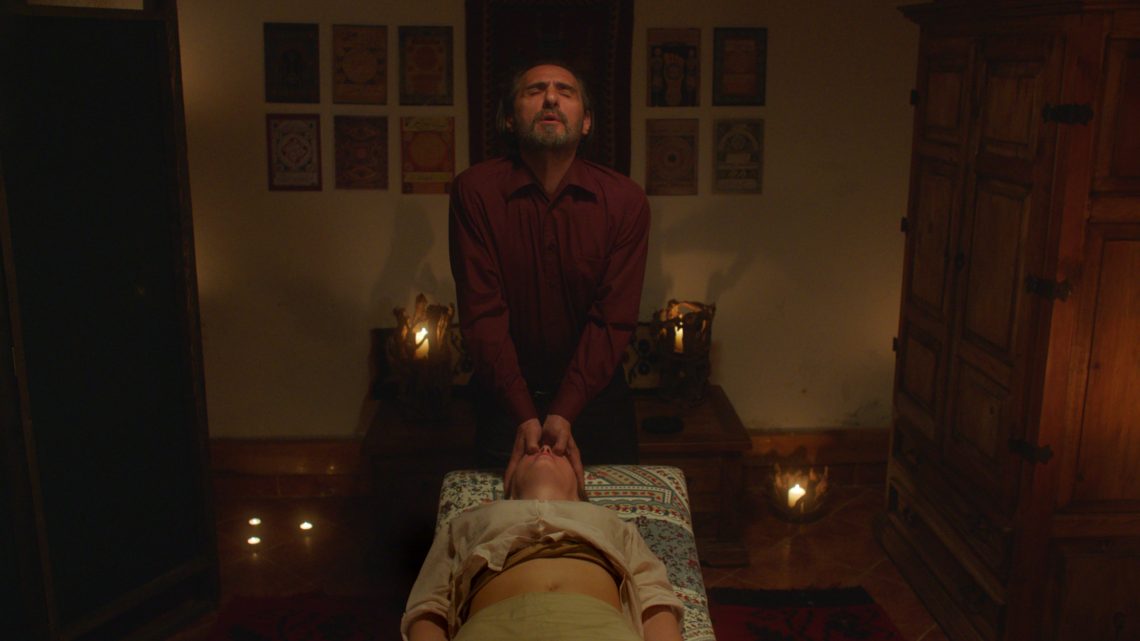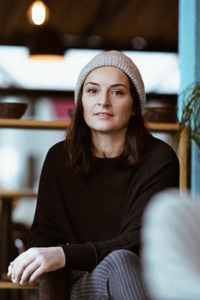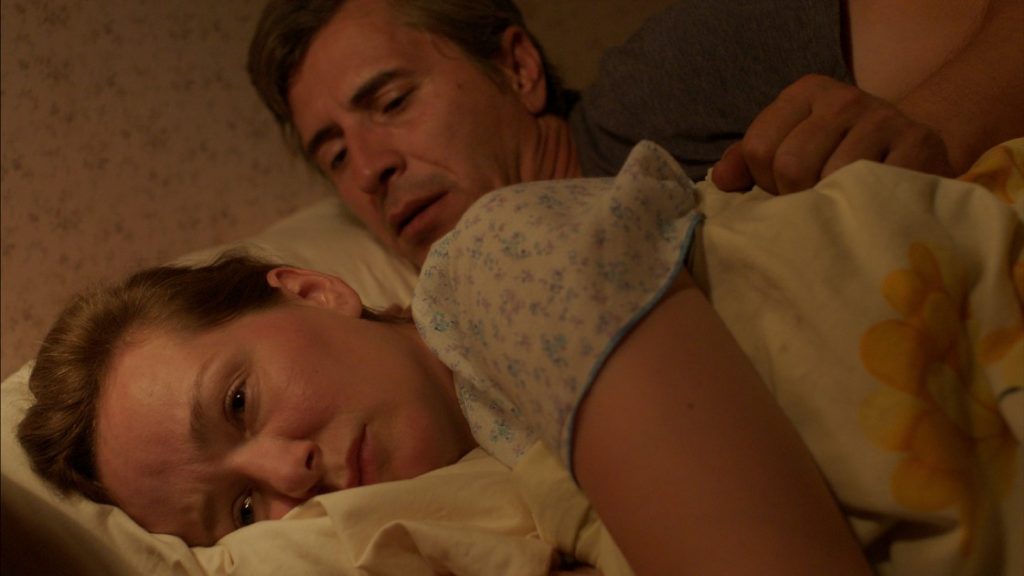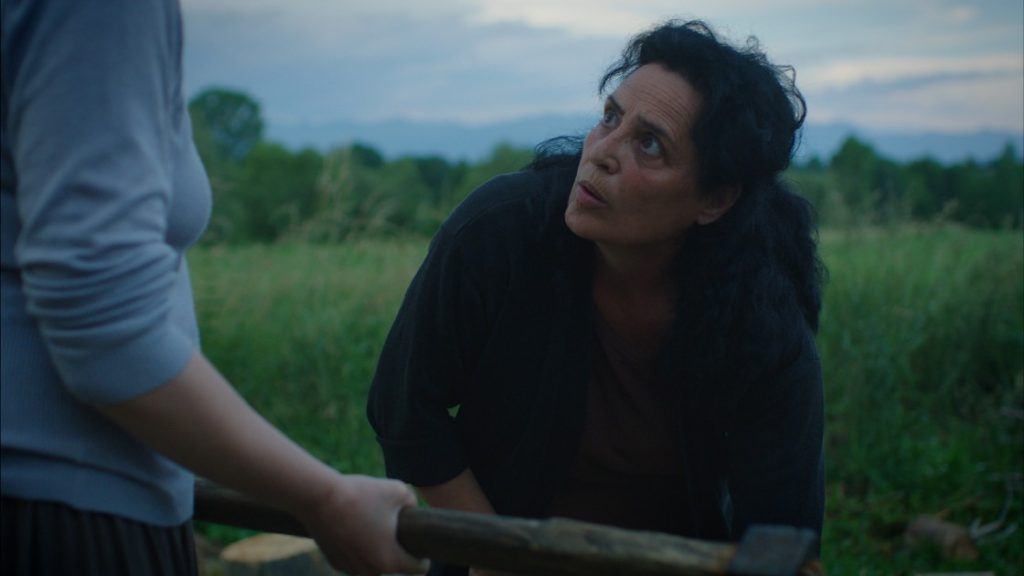
ZANA Interview: Antoneta Kastrati
“In telling this story of war and recovery it was important for me to talk about patriarchy and society’s constructed beliefs that further imprison women. Furthermore, I do not see oppression and brutality at home as separate from violence and brutality in war.”
“To open the door, you must make a sacrifice.”
ZANA is a devastating portrait of post-war trauma. It is haunting and quiet, with a sense of dread lurking in every corner.
Set in a small village in Kosovo, ZANA explores motherhood, grief and mysticism. Lume (Adriana Matoshi) is a shell of a woman mourning a violent, unexplainable loss that others seem to have come to terms with.
You watch as she suffers in a society that doesn’t value her voice, and it wasn’t until the credits rolled that the full weight of Lume’s pain hit me. Matoshi’s performance is stunning, she is given the space to say very little yet expresses multitudes through a single glace.
ZANA is a beautifully tragic film; an empathic study of the effects of war and loss, and the people who are forced to continue on afterwards.
 Writer-director Antoneta Kastrat’s striking debut feature, ZANA, has its World Premiere at the Toronto International Film Festival on September 7th.
Writer-director Antoneta Kastrat’s striking debut feature, ZANA, has its World Premiere at the Toronto International Film Festival on September 7th.
Kastrat is a Los Angeles-based filmmaker from Kosovo. She has a Masters in Journalism and completed the AFI Directing Workshop for Women. Kastrat has directed a number of award-winning documentaries and narrative shorts and her most recent short film She Comes In Spring premiered at the Busan Film Festival.
You can see the World Premiere of ZANA at this year’s Toronto International Film Festival, screening as part of Discovery on September 7th at 9:30PM, September 9th at 10:00PM and September 11th at 9:30PM.
Tell us a little bit about yourself and how you got involved with filmmaking.
Antoneta Kastrati: I am the writer, director and main editor for ZANA. I come from Kosovo and lived there until 10 years ago. Now I am based in Los Angeles.
I started to get involved in film right after the war in Kosovo, making documentary films that addressed post-war social issues mainly, gender inequality, reproductive health, deforestation, homophobia, etc. I was dedicated to making films that broke taboos in our society and opened up more in-depth discussions about things we would not normally see on TV. I moved to Los Angles in 2009 to study filmmaking at the American Film Institute, with my partner and producer Casey Cooper Johnson and my sister Sevdije Kastrati (Cinematographer).
Tell us about ZANA, and why you decided to make such a personal feature debut.
AK: ZANA tells the story of a woman’s journey through grief and post-war trauma in a small conservative village community in Kosovo. It is a story about motherhood in war and the power of a mother-child connection. It is a story about the dynamics of female power and agency.
I was a teenager in my village when the Kosovo war happened; my mother and sister were killed. It was natural for me as a filmmaker that I would one day deal with this part of my painful past and the everlasting effects of war.
In telling this story of war and recovery it was important for me to talk about patriarchy and society’s constructed beliefs that further imprison women. Furthermore, I do not see oppression and brutality at home as separate from violence and brutality in war.
There was an interesting mix of the modern and the mystical, why did you want to tell this story through this lens?
AK: The reality in Kosovo is such that there is a stigma around psychiatry. Kosovo is progressing rapidly and is quite a modern society but it has one foot still deeply rooted in mysticism. A large portion of the population still believe in curses and black magic and it has become commercialized after the war. If someone is having any psychological issues, mental or even physical they are sent to magical healers, out of desperation. And of course, it is always women.
I made a documentary about this in 2009 called seeking magic. I find it troublesome and fascinating at the same time.
Ultimately as a filmmaker, I am drawn to mystery and the unknown. I love mysteries and thrillers, they are my favorite genre. I tend to make films that have elements of mystery in them and that explore the world of dreams and memories. I value poetry in film. I did not want ZANA to be a straight drama.
There are some truly beautiful shots in this film (the last one in particular) can you speak about the look of the film and how you achieved it?
AK: For the look of the film, I have to credit my cinematographer Sevdije Kastrati. She happens to be my sister too, and we have always worked together and share the same sensibilities and esthetics. For both of us, it was truly special to go back to the village where we grew up and have access to such beautiful locations. ZANA is a very dark and heavy film but we didn’t want to have a grey looking movie. We wanted to capture the beauty and the greenery of the village just as we remember it during the war. I remember the grass was so tall and green, nature was overabundant, and yet horrible things were happening. We wanted to create this world in contrast to our protagonist Lume’s inner world expressed in her dreams that was much darker and yet not separate, moving seamlessly from one to another. My sister is very good at creating very realistic and yet powerful haunting images.
Regarding the last shot of the movie, I saw that shot very clearly as I was writing the script. It was a very specific feeling I wanted to express and I am very happy we achieved it thanks to the combined work of my sister together with my make up artist and the much-awaited snow that we got just a day before the shoot.

Adriana Matoshi is magnificent in this role. She says very little yet is powerfully emotive. What was it like working with her and how did you approach this subject matter with her to help bring about this performance?
AK: Adriana is a remarkable actress and great to work with. She got the character immediately and understood it deeply from the moment she read the script. I had many conversations with her prior to the shoot, lots of rehearsals. She works intuitively and internalizes the character but is also a good listener. I was there to guide her lightly. We had such good communication and connection that by the end of the shoot it felt like we were communicating telepathically, I would only look at her and she knew what she had to do.
ZANA deals with a side of motherhood we don’t usually see on film. Why did you decide to frame a post-war story in this way?
AK: Because I did not want ZANA to only focus on the effects of war and grief. I wanted to examine the meaning of motherhood and the dilemma of being a mother in war and post-war setting. It is a question about the future not only the past.
Can you tell us about some/all of the other amazing women who worked on this film?
AK: Sevdije Kastrati, whom I mentioned above is my DP as well as Co-Producer in the film. A graduate of AFI Cinematography program, based in LA she is the first female cinematographer from Kosovo and is one of the most sought out Cinematographers in the Balkan region. She has done so far 6 feature films over there, one in LA and she is currently shooting in Macedonia finishing her 7th feature film.
Blendina Xhema, a very talented hardworking Art Director. She was able to do so much with such little budget.
Valmira Hyseni — my Line Producer. Managed so much in our shoot, which is not easy to do in the Balkans. She is also producing her own films and is a very talented upcoming producer in Kosovo.
Stella Laknori — Talented Costume Designer from Albania.

Tell us about why you are a feminist and why it’s important to your filmmaking.
AK: Feminism for me is not a choice. It’s something I simply am by the mere fact that I was born and live in a society where there is still gender inequality. I grew up in a very patriarchal society, I had to fight for my rights since I was a little girl, and continue to do so. Unfortunately, gender inequality is deeply embedded in every facet of our personal, social and political life, it has been so for so long and it will take generations to transform it. Change does not happen on its own, it happens 1. by being an example of it, 2. by helping others advance and 3. by creating long term conditions and systemic changes. I consider myself part of this change.
What are you working on now/next?
AK: I am now working on developing my next feature film, which will take place in Los Angeles. Also an idea for a TV show pilot.
Finally, recommend one #MUFFApproved film for our blog readers!
AK: Boys Don’t Cry by Kimberly Pierce
Keep up to date with ZANA: Facebook | Instagram
*This post was originally featured on The MUFF Society.*

